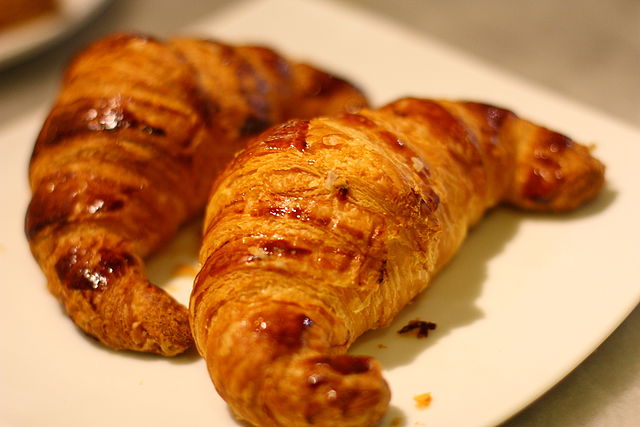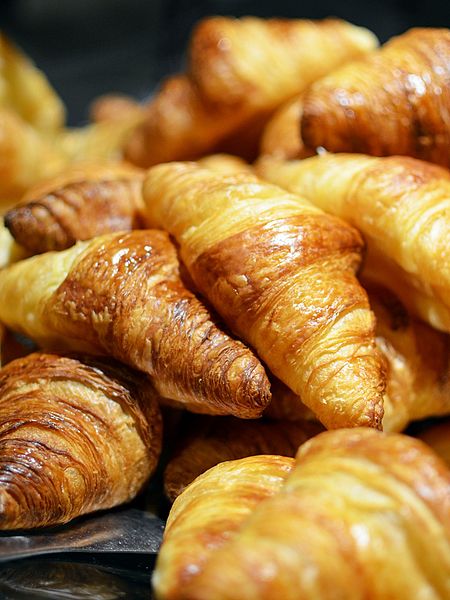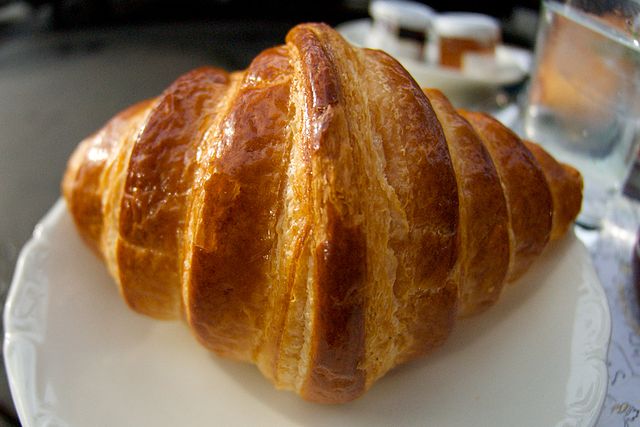
A book newly acquired by the Thammasat University Libraries discusses psychological experiments showing that people who smell something tasty, such as baked goods, tend to behave better towards others. Human Kindness and the Smell of Warm Croissants: An Introduction to Ethics is by Ruwen Ogien, a philosopher at the French National Centre for Scientific Research.
Baked Goods in Thailand
As any visit to a mall in Thailand easily proves, people are ready to smell and eat baked goods. In 2015, according to Euro Monitor, retail value growth of baked goods increased somewhat, due to wide availability and busy consumers who wanted quick snacks. President Bakery Public Company Limited, a Thailand-based company engaged in the manufacture and sales of bakery products, remains the industry leader in the Kingdom. It sells sliced bread, buns, snack cakes, cookies, pies, and other items. On its website, the company’s Farmhouse brand declares:
The company does not only do business for profit, but also for quality so that the consumers may gain the highest benefits based on 4 practices as follows:
- Using the best raw materials to guarantee the highest product quality.
- Continuous product development which fulfills nutrition needs of Thai.
- Developing manufacturing and management technologies for constant improvement in product quality.
- Holding on to safety, freshness, and cleanliness of products to offer the best to consumers.
Baked goods are expected to continue positive retail value growth. By contrast, in 2015 breakfast cereals had a somewhat slower current retail value growth. Those who did buy breakfast cereals tended to consider them healthier than other breakfast alternatives, as well as quick and convenient to prepare. Nestlé (Thai) Ltd is the largest seller of breakfast cereals in the Kingdom.

Opportunities
In 2013, Business Opportunities Study in Thai Bakery Sector, a report, was published by Larive (Thailand) Co. Ltd., a Dutch consultancy that helps companies develop business in emerging markets. The report was commissioned by the Embassy of the Kingdom of the Netherlands in Bangkok.
The report points out that two decades ago, baked good were less popular in Thailand than they are today, especially when compared to other ASEAN countries:
In 2012 the Thai baked goods market was estimated to be worth nearly 27 billion baht… Rice and noodles remain staple food for the average Thai household; but bread, pastry or cookies can usually be found in the snack corner in many homes. Business executives and many office workers in Bangkok and other urban areas have a bite of a sandwich or bun or croissant or even donut with their coffee for breakfast – either in a coffee shop or purchased ‘on-the-go.’ On weekends, shopping malls are packed with people of all ages to enjoy the cool atmosphere, the pleasure of shopping, and dining out with family and friends – at a wide selection of restaurants, bakery shops and donut outlets. Not only do they eat on the premises, they usually also buy a bag of baked goods to take home. From the small-scale bakery operation of the past, the industry now has more than 700 medium-sized and large businesses with nearly 14,000 locations/outlets nationwide.
These sales outlets include in-store bakeries in supermarkets, cafés, retail and industrial bakeries, doughnut shops, and convenience stores. Home bakers also sell their products. In 2012, the Au Bon Pain and Dunkin’ Donuts franchises in Thailand were acquired from Navis Capital by Sub Sri Thai PLC (SST), a company listed on the Stock Exchange of Thailand, mainly known for its warehouse and harbor businesses. Some sources state that in recent years the baked goods market has increased annually by over 10 percent. As in-store bakery shops and retail outlets increase, the industry will continue to grow. Bread, pastry, cake, doughnuts, and cookies and biscuits are mainly bought at retail bakery chains and convenience stores. The third most popular site for finding bakes goods in Thailand is in-store bakeries at supermarkets, followed by in-house bake shops at hotels, and home bakers. Leading retail bakery chains include S&P, Yamazaki, Au Bon Pain, BreadTalk, Gateaux House, Mr. Donuts, and Dunkin’ Donuts.

Baking the products.
To make baked goods, products are needed. Flour, margarine, shortening and blended butter are purchased locally, while flour mixes and pure creamery butter are purchased from abroad. Most bakery equipment was imported from Switzerland, Germany, Italy, France, Spain, and Japan, but lately China has also been an important source. Chinese equipment tends to be cheaper products because salaries are lower than elsewhere, and China’s bilateral trade agreement with Thailand makes it possible to avoid paying tariffs. Second in sales in the Kingdom is CPRAM, a subsidiary of Charoen Pokphand Group (CP Group) which distributes baked items through 7-Eleven convenience stores. S&P developed from a family-run business founded over forty years ago to a multi-billion baht company that sells to Singapore, Taiwan, China, Switzerland and the U.K. In the Kingdom, bakery ingredients are mostly supplied by Kim Chua Group Co., Ltd. (KCG). Business Opportunities Study in Thai Bakery Sector concludes that while Thailand provides its own granulated sugar and butter, margarine, or shortening, other bakery ingredients must be imported. Overseas manufacturers have an opportunity to provide
high-grade wheat flour, yeast, food additives, enhancers, improvers, flavors and aroma, cocoa powder/couverture chocolate.
One specific context where high-grade ingredients may be sold is at hundreds of luxury hotels which require more and more baked goods for demanding customers. Baking equipment is another importing opportunity. Despite the advance of Chinese equipment, most industrial and retail baker chains in Thailand prefer large equipment made in Europe for its high quality and endurance. The report concludes:
Before the turn of the 21st century, the Thai bakery industry was largely considered one of the smaller and less developed in South East Asia. But this status has improved significantly in the last 5 to 10 years with demand for daily baked products having grown faster than the overall economy. Rice and noodles remain to be part of the Thai conventional diet, yet bread and other baked goods consumption has slowly but surely become entrenched in the daily life of mostly urban Thais on the go – office employees, executives and students alike. ‘In Bangkok and large cities upcountry, the ‘rice for breakfast tradition’ is gradually being replaced by bread/croissant/sandwiches/etc. especially amongst female office workers. Compared with other countries in Asia (e.g., Japan, Philippines), Thailand is perceived to be lagging behind in bread per capita consumption and there is certainly a room for growth.’ –Dech Sangsrijan Thai Bakery Association President.
To help train Thai people for this rising industry, a choice of baking and culinary schools is available in Bangkok. They include the UFM Baking & Cooking School; Le Cordon Bleu Dusit Culinary School; School of The Oriental Hotel Apprenticeship Programme (OHAP); and the Macaron Pastry Training Center. These are intended to prepare a new generation of experts in breads, cakes, and pastries, including croissants.

(All images courtesy of Wikimedia Commons).
